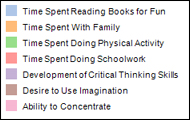
A new study on the reading habits of children found that use of digital or electronic devices -- texting on smartphones, listening to iPods or using online social networks -- may have a negative impact on reading time, family time and physical activity.
The 2010 Kids and Family Reading Report, based on a survey commissioned by education materials publisher Scholastic, also found that many children fail to critically evaluate online information. Among children ages 9 to 17 years old, 39 percent think that the information that they find online is always correct.
Use the interactive graph below to see how advances in digital technology may be changing a generation of young Americans:
The report is not all bad news for the nation's children. Twenty-five percent of them have read an e-book on a digital or electronic device, and 57 percent are interested in doing so in the future.
More highlights from the report:
- Nine out of 10 children say they are more likely to finish books they choose themselves.
- Parents are using tactics to encourage reading that appear to result in more frequent reading, including making sure there are interesting books at home (for children ages 9 to 11 and 15 to 17 years old), putting limits on the amount of time spent using technology (for children ages 9 to 11 years old) and suggesting books they might like.
- From ages 6 through 17 years old, the time children spend reading declines while the time they spend going online for fun and using a cell phone to text or talk increases.
- When asked about the one device parents would like their child to stop using for a one or two week period, parents most often cite television, video game systems, and cell phones
- When asked about the most important outcome of reading books for fun, children ages 9 to 17 years old say it is to: open up the imagination (43 percent), be inspired (36 percent) and to a lesser degree, to gain new information (21 percent).
About the Study
Scholastic, the world's largest publisher and distributor of children's books, worked with the market research firms Quinley Research and Harrison Group to conduct a survey on family attitudes and behaviors regarding reading books for fun in the digital age. The findings of their research were based on a nationally representative sample of 1,045 children age 6-17 and their parents for a total of 2,090 respondents.
Read the press release and highlights: Kids and Family Reading Report Highlights
Download the full report: 2010 Kids and Family Reading Report: Turning the Page in the Digital Age (PDF)
What Do You Think?
Share your thoughts in the comments section below or weigh in on Facebook or Twitter.
Data visualization by Anthony Calabrese,a State of the USA web producer.
 Print This
Print This RSS Feed
RSS Feed